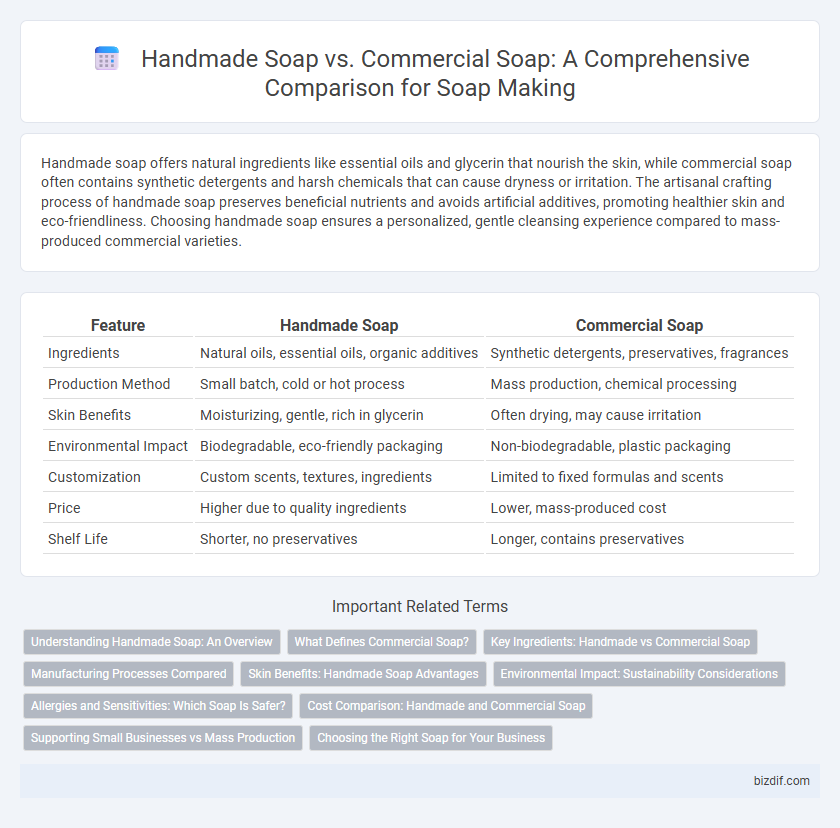Handmade soap offers natural ingredients like essential oils and glycerin that nourish the skin, while commercial soap often contains synthetic detergents and harsh chemicals that can cause dryness or irritation. The artisanal crafting process of handmade soap preserves beneficial nutrients and avoids artificial additives, promoting healthier skin and eco-friendliness. Choosing handmade soap ensures a personalized, gentle cleansing experience compared to mass-produced commercial varieties.
Table of Comparison
| Feature | Handmade Soap | Commercial Soap |
|---|---|---|
| Ingredients | Natural oils, essential oils, organic additives | Synthetic detergents, preservatives, fragrances |
| Production Method | Small batch, cold or hot process | Mass production, chemical processing |
| Skin Benefits | Moisturizing, gentle, rich in glycerin | Often drying, may cause irritation |
| Environmental Impact | Biodegradable, eco-friendly packaging | Non-biodegradable, plastic packaging |
| Customization | Custom scents, textures, ingredients | Limited to fixed formulas and scents |
| Price | Higher due to quality ingredients | Lower, mass-produced cost |
| Shelf Life | Shorter, no preservatives | Longer, contains preservatives |
Understanding Handmade Soap: An Overview
Handmade soap is crafted using traditional methods that incorporate natural oils, butters, and essential oils, resulting in a product rich in glycerin that moisturizes the skin. Unlike commercial soaps, which often contain synthetic detergents and additives, handmade soaps retain natural ingredients that support skin health and reduce irritation. Artisanal craftsmanship allows for customization of ingredients, offering a variety of scents and textures tailored to different skin types and preferences.
What Defines Commercial Soap?
Commercial soap is typically defined by its mass production using synthetic detergents and artificial fragrances that enhance shelf life but may strip natural oils from the skin. These soaps often contain additives, preservatives, and a higher pH level, leading to a stronger cleaning effect but potential skin irritation. Unlike handmade soap, commercial soap prioritizes consistency, cost efficiency, and prolonged stability over natural ingredients and glycerin content.
Key Ingredients: Handmade vs Commercial Soap
Handmade soap primarily uses natural ingredients such as plant-based oils, essential oils, and glycerin, which nourish and moisturize the skin without harsh chemicals. Commercial soap often contains synthetic detergents, sulfates, and artificial fragrances that can strip the skin of its natural oils and cause irritation. The absence of preservatives and synthetic additives in handmade soap contributes to its gentle and skin-friendly properties compared to commercial soap.
Manufacturing Processes Compared
Handmade soap is crafted through small-batch processes using natural ingredients like oils, lye, and essential oils, which undergo cold or hot saponification methods preserving glycerin and beneficial properties. In contrast, commercial soap typically involves mass production with synthetic detergents, fillers, and harsh chemicals, often removing natural glycerin for separate sale. The artisanal approach prioritizes quality and skin benefits, whereas commercial manufacturing emphasizes cost efficiency and shelf longevity.
Skin Benefits: Handmade Soap Advantages
Handmade soap offers superior skin benefits compared to commercial soap due to its natural ingredients like essential oils, shea butter, and glycerin, which deeply nourish and moisturize the skin. Its gentle formulation avoids harsh chemicals, sulfates, and synthetic fragrances that can cause irritation and dryness. The retaining of natural oils in handmade soap enhances skin hydration and maintains the skin's pH balance for healthier, softer skin.
Environmental Impact: Sustainability Considerations
Handmade soap often incorporates natural, biodegradable ingredients and minimal packaging, reducing environmental pollution and waste compared to commercial soap, which typically contains synthetic chemicals and petroleum-based additives harmful to ecosystems. The small-batch production of handmade soaps supports sustainable practices by lowering carbon emissions and conserving water resources, unlike large-scale commercial manufacturing. Choosing handmade soap contributes to reduced plastic waste and promotes eco-friendly alternatives that prioritize the planet's health.
Allergies and Sensitivities: Which Soap Is Safer?
Handmade soap, often crafted with natural ingredients like essential oils and plant-based butters, tends to be gentler on sensitive skin and less likely to trigger allergies compared to commercial soap, which frequently contains synthetic fragrances, preservatives, and harsh chemicals. Individuals with eczema, psoriasis, or fragrance sensitivities benefit from handmade soap's minimal, hypoallergenic formulations, reducing the risk of irritation and allergic reactions. In contrast, commercial soaps may exacerbate skin conditions due to artificial additives, making handmade options the safer choice for allergy-prone skin.
Cost Comparison: Handmade and Commercial Soap
Handmade soap generally costs more per bar due to the use of natural ingredients, artisanal production methods, and smaller batch sizes, whereas commercial soap benefits from mass production and synthetic additives, reducing expenses. The price difference reflects the quality and ingredient transparency, with handmade soap often offering skin-friendly, eco-conscious benefits despite a higher upfront cost. Consumers seeking affordability may opt for commercial soap, but those prioritizing natural composition often justify the premium cost of handmade alternatives.
Supporting Small Businesses vs Mass Production
Handmade soap supports small businesses by using artisanal methods and natural ingredients, fostering local economies and ethical sourcing. Commercial soap relies on mass production techniques, often prioritizing cost-efficiency and synthetic additives over quality and sustainability. Choosing handmade soap promotes environmental responsibility and preserves traditional craftsmanship.
Choosing the Right Soap for Your Business
Handmade soap offers unique selling points like natural ingredients, customizable scents, and skin-friendly properties, appealing to niche markets seeking artisanal quality and eco-conscious options. Commercial soap provides consistency, cost-efficiency, and large-scale availability, making it ideal for businesses focused on mass production and competitive pricing. Selecting the right soap depends on your target audience, brand values, and business model, balancing authenticity with scalability to optimize customer satisfaction and profitability.
Handmade Soap vs Commercial Soap Infographic

 bizdif.com
bizdif.com